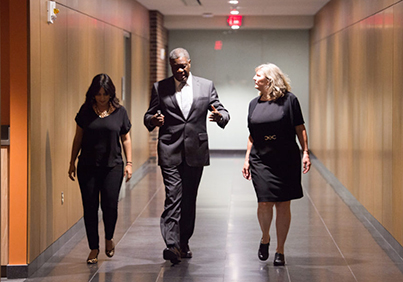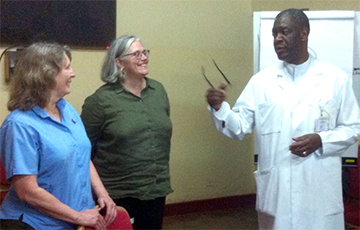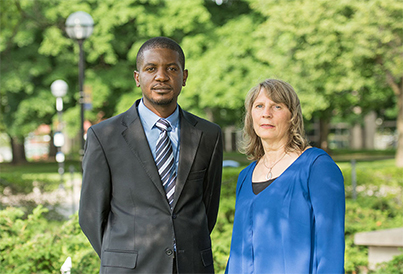When Congolese physician Denis Mukwege, MD, PhD, travels this month to Norway to receive the world’s most prestigious humanitarian award, the University will be well represented. Mukwege’s son, Alain, a long-term visiting research scholar at the School of Nursing, will be there, as will Professor of Nursing Janis Miller, who helped the elder Mukwege launch an academic research training center in Congo five years ago and has remained involved in the region ever since.

“I was incredibly honored to be invited to Oslo for the ceremony. I wouldn’t miss it for anything,” said Miller, RN, PhD. “There is no one more deserving of the award. Dr. Mukwege is a great activist, an incredible surgeon, scholar and, to me, a terrific mentor and collaborator.”
Mukwege’s relationship with the university began in 2010 when he was invited to Ann Arbor to receive the Wallenberg Medal, a prominent U-M humanitarian award. Miller was asked by a colleague to help escort the guest of honor between meetings ahead of the evening ceremony.
“Dr. Mukwege was hardly known at the time. I wasn’t really planning to go to the ceremony but at the last minute I was asked because of my own research interest if I would help,” Miller said.

She emerged from that day so transformed that it altered the trajectory of her own research and career. Her international work shifted an entire continent, from Central America to Africa. She made her first visit to Democratic Republic of Congo a little more than a year later and, two years after that, helped Mukwege establish the International Center for Advanced Research and Training (ICART), which connects researchers from around the world with Congolese scholars and trainees to study the gender-based violence issues which are so prevalent in the conflict-ridden Democratic Republic of Congo.
“Who knew that helping him find his way around and carrying his jacket would lead to this?” Miller said. “I had no prior desire to ever go to Africa and no conception of Congo. I had never been compelled like this and it came from him personally. He really connects with people and has this undeniable warmth.”
Established in 2013 with a U-M Third Century Initiative Grant, ICART now oversees and facilitates research projects, offers research training seminars for local scholars, and hosts a growing biennial research symposium. The last one, in 2017, attracted hundreds of participants from all over the world.
Others from U-M are involved as well, including Professor of Public Health Sioban Harlow, who is 2017-18 received a Fulbright Scholar grant to work through ICART on a project to analyze clinical surveillance databases to track sexual violence cases in the region around Bukavu, on the eastern border with Rwanda, where ICART and Mukwege’s Panzi Hospital are located.

“Clinical surveillance databases may not be the most exciting thing to write about, but ensuring quality and utilization of these important and unique tools will be a significant part of addressing the Peace Prize mandate in this war-torn country,” said Harlow, PhD. “The true gift of Dr. Mukwege is his extraordinary insight into the interlinkages between the unspeakable physical harm he repairs in his surgical wards, the lack of responsible governance, and the upstream factors that create the conditions for sexual violence, such as the trafficking in conflict minerals.”
Mukwege opened his Panzi Hospital in 1999 and quickly became renowned for his treatment of sexual violence survivors, mostly women who’d been victimized by members of militias fighting over control of the region’s mineral resources. Adept at treating physical wounds, Mukwege quickly realized that surgery wasn’t enough. His patients needed community support, psychological services, economic and educational assistance, and more to break the cycle of violence.
His Panzi Foundation dedicated to these community efforts opened in 2008. His vocal advocacy for the victims earned him praise internationally but death threats at home, where the powerful perpetrators of sexual violence didn’t like challenges to their authority. Mukwege fled Congo in late 2012 after an assassination attempt but returned to work in early 2013. Today, Panzi Hospital operates under an umbrella of United Nation’s-provided security, a fragile bubble of relative safety in an otherwise dangerous region.
Mukwege’s son, Alain, also a Congolese-trained physician, came to the United States to earn a master’s degree in clinical research from the Mayo Clinic and joined the U-M School of Nursing in 2015. He works closely with Miller on both ICART-related projects and other studies. For safety reasons, he has not been to Congo in several years. The family has made huge personal sacrifices for their humanitarian cause.
“I am definitely so proud and so inspired by my father and what he has been able to accomplish,” said Alain Mukwege, MD, MA. “He’s shown me that if you dedicate yourself fully, the sacrifices bring rewards that are beyond any material things. I hope to emulate that when I have the opportunity to go back home.”
It is unclear when that might be. Congo is holding elections Dec. 23 but the campaign season has already been marked by violence and unrest that has the international community worried. In the meantime, Alain will see his father for the first time in more than a year at the upcoming Nobel ceremony on Dec. 10. Mukwege is being honored alongside Nadia Murad, an Iraqi survivor of sexual assault who has become a vocal advocate for other victims.
“The award is a wonderful surprise. And I know my father would say that it’s not about him, but about what it means for Congo and the impact and attention it will bring to the cause he is so passionate about,” Alain said. “It’s a recognition not only of his work but of the entire staff of the hospital.”
The award also lends credibility to ICART and the work Drs. Miller, Harlow and others are doing to advance research in Congo.
“ICART is such a small but important part of what is happening in Panzi Hospital,” Miller said. “We’re demonstrating that it is possible to do research in conflict zones. That’s critical if you’re trying to solve a problem not one woman at a time, but for an entire population.”
